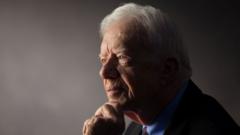The life and leadership of former President Jimmy Carter serve as a poignant reflection of today's political landscape, revealing a continuum of challenges that current President Joe Biden grapples with. After leaving office, Carter's presidency faced a plethora of crises that resonate with issues in 2024, despite the stark contrast in the eras.
In the late 1970s, America was engulfed by a crisis of confidence, mired in economic upheaval and confrontations on the global stage. As the nation now braces itself in 2024, familiar themes recur, such as economic downturns and environmental issues, along with complex relations involving global powers—particularly Russia, Afghanistan, and the Middle East.
Carter's legacy is perhaps best encapsulated by his role in the Camp David Accords, which fostered peace between Egypt and Israel in 1978; however, the aftermath of the Iranian hostage crisis cast a long shadow over his presidency and significantly influenced his downfall. Similarly, Biden's tenure has been marked by struggles in foreign diplomacy, highlighted by challenges in the Middle East and the struggle to maintain American influence through the chaotic withdrawal from Afghanistan.
On the terrain of global affairs, both leaders encountered or are encountering the limits of American influence. For Carter, the implications of his presidency were starkly revealed when a vibrant moment of diplomatic success evaporated amid the struggles in Iran. Biden has witnessed similar trials, such as the destabilizing impacts of the Hamas attack on Israel and the war in Ukraine. Although he has succeeded in garnering support for Ukraine against Russian aggression, uncertainties loom regarding the war's long-term effects on U.S. foreign policy.
While their foreign policies differ in approach and action, both leaders have been faced with the stark realization of America’s place on the global stage, illustrating a continuing struggle to maintain influence in a world filled with rising powers like China—the significance of which can be traced back to Carter's historic decision to normalize relations with Beijing in 1979.
Domestically, Carter’s presidency was overshadowed by the energy crisis and inflation reminiscent of today’s economic turbulence. Although the U.S. economy has experienced steady growth since Biden took office, the specter of inflation has haunted his administration, eliciting widespread public dissatisfaction. Carter lamented the "crisis of confidence" in American institutions, a sentiment that echoes persistently in the current political discourse, which is exacerbated by distrust that has pervaded the electorate.
Public confidence in government under Carter declined dramatically, a trend that resonates with Biden’s struggles to turn around an increasingly skeptical electorate. The distrust culminated during Trump's presidency, amidst growing political divides, further complicating Biden's efforts to restore faith in leadership.
With the backdrop of contrasting leadership styles, Carter promoted humility and service after his presidency, winning a Nobel Peace Prize and engaging in humanitarian efforts; countering this, Trump's post-presidency has centered on rallying support for a potential return to power.
Ultimately, the parallels between Carter and Biden illustrate an enduring narrative of American presidencies, underscoring how certain challenges transcend time, shaping leadership styles and public sentiment while inviting reflection on how far the nation has come—and how much has remained the same in the quest for effective governance amidst persistent trials.



















